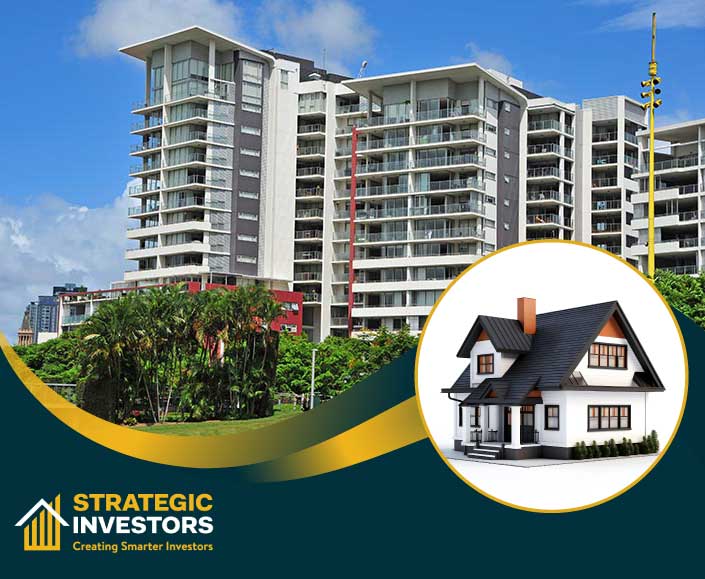
Are you contemplating where to channel your investment dollars for maximum benefit—into a house or an apartment?
With focus on real-world figures and practical insights, this article breaks down the key financial considerations and market trends shaping the profitability of house vs apartment investment, setting the stage for an informed decision tailored to your investment goals.
Key Takeaways
- Houses typically offer higher capital growth due to land value appreciation, while apartments generally provide higher rental yields due to lower land-to-asset ratios and shared maintenance costs.
- Affordability is key in property investment; apartments cater to lower budgets and allow diversity in investments, though additional fees like stamp duty and strata fees must be factored in.
- Strategic decisions in property investment are based on thorough research, understanding market trends, and professional consultations to target investment properties with strong appreciation potential and cash flow opportunities.
Understanding Investment Property Types

As an investor, it is vital to evaluate the advantages and disadvantages of investing in houses versus apartments. This decision will be influenced by various factors, including:
- The purchase price
- Potential for capital growth
- The expected rental yield
- The level of ongoing maintenance required
Capital Growth: Houses vs Apartments
Houses, especially higher capital growth houses, typically hold a higher capital growth advantage over apartments. Why? Because the land they sit on appreciates in value over time. This appreciation is reflected in the data, with house prices in capital cities rising significantly more than unit values between March 2020 and January 2024. Now, the price difference between houses and apartments has increased by a record 45% over the past four years.
However, bear in mind that location is a key determinant in property investments. Properties with substantial land in high-demand areas close to the city, schools, and amenities often experience enhanced land value growth.
Rental Yield Dynamics
In terms of high rental yield, lower land value apartments typically outperform houses, often resulting in a lower rental yield for the latter. Despite having a lower land-to-asset ratio, apartments tend to offer higher rental yields due to shared upkeep costs. Factors like infrastructure and employment opportunities in strategic urban locations can result in apartments outperforming houses in rental growth.
Furthermore, smaller Australian households may prefer apartments, which increases demand and rental yields, while houses often attract long-term tenants like families due to space and fewer restrictions. And here’s an added bonus: the purchase price of one house might allow for acquiring several apartment units, leading to a significant rental income.
The Role of Body Corporate Fees
If you invest in apartments, you’re likely to come across the term “body corporate fees” frequently. Also known as strata fees, these are collected to cover the costs of grouped maintenance and building insurance for the property. The fees are used for the upkeep of common areas within apartment complexes, including gardens and courtyards, and they can vary depending on the building’s condition and how efficiently it is managed.
Interestingly, body corporate fees can sometimes be less than the ongoing expenses associated with maintaining a freestanding property, such as a house. Portions of these fees may even be claimable as tax deductions by investors. So, while body corporate fees may seem like an added expense, a well-managed body corporate with a proper fee structure can ease the investor’s property management responsibilities, making apartment investments more straightforward.
Investment Entry Points: Affordability Considerations

- Increased rental income
- Future adaptability
- Reduced associated risk
- A diversified investment portfolio, when compared to investing in a single house
But remember, not all costs are upfront.
Additional costs to consider when purchasing an apartment include:
- Stamp duty
- Strata fees
- Loan application fees
- Ongoing service fees
These costs are significant considerations that impact the affordability and financial planning for the purchase of an apartment.
Comparing Purchase Prices
Now, let’s examine some figures. The national median value for units is $596,308, while for houses it stands at $760,137. This difference in purchase price means that apartments can be more affordable than houses, making them an appealing choice for investors.
However, keep in mind that affordability extends beyond just the purchase price; it also encompasses potential rental income, capital growth, and finding an affordable entry point.
Assessing Upkeep and Maintenance
Maintenance costs can significantly impact your investment’s profitability. For houses, these expenses include repairs, landscaping, and general upkeep, which can fluctuate based on the property’s age and condition. House owners also need to cover insurance premiums for the building as a part of maintenance and upkeep costs.
For apartments, on the other hand, you’ll need to consider:
- Strata fees for the maintenance of communal areas. These fees can vary with the amenities and services provided.
- Part of the body corporate fees in apartments goes towards maintenance costs, but these can be expensive.
- Owners of apartments share the responsibility for common property maintenance costs, which is determined collectively by the owners’ corporation.
While the costs can be higher, they are generally more predictable than the maintenance costs for houses.
Strategic Property Investing Decisions

- Your overall investment objectives
- Housing demand and supply trends
- Property location
- Affordability
Building wealth hinges on making informed investment decisions, which involves dedicating time to research and gaining a solid understanding of the real estate market. Speaking to the following professionals is beneficial when considering an investment in a house or an apartment to ensure that decisions are well informed:
- Real estate agents
- Accountants
- Seasoned property investors
- Financial advisers
Investment Grade Properties
Investment-grade properties are the cornerstone of successful property investment. These properties are identified by factors such as:
- Strong capital appreciation
- Steady cash flow
- Opportunities for value addition
- Strong rate of capital appreciation
- Liquidity and easy management
- Act as a hedge against inflation
- Offer good tax benefits
- Appeal to owner-occupiers
- Location close to lifestyle amenities
A critical factor for investment grade properties is being situated in areas with high demand and limited supply, such as high rise buildings, contributing to capital growth, and located in suburbs with a higher number of homeowners.
Analyzing Market Trends
Grasping market trends is vital for making educated investment decisions. Here are some key trends in the Australian real estate market:
- Demand for apartments is increasing due in part to the rising number of single-person households and the growing preference for living in proximity to city centers and amenities.
- The Australian real estate market experienced a steady growth rate of house and unit prices, with a 5.42% national annual growth in 2023.
- Factors such as increased immigration and established home demand have influenced this growth.
Understanding these trends can help inform your investment decisions in the real estate market.
Government programs and rising foreign investment contribute significantly to shaping the housing market, promoting urban development and gentrification, especially in New South Wales and Victoria. However, consumer sentiment towards purchasing houses is generally pessimistic due to concerns over escalating rate hikes and living costs, particularly as regional Australia faces diminishing affordability.
The Investor’s Perspective: Rental Income and Tenant Attraction

Moreover, if an entire block has rental stock, it can impact demand for rental properties, demonstrating the need to consider the ratio of renters to owner-occupiers.
Maximizing Rental Income
Maximizing rental income is integral to successful property investment. Here are some strategies to consider:
- Properties located in proximity to desirable amenities or key locations can command higher rental rates due to increased tenant demand.
- Strategic improvements like adding living spaces or bedrooms can boost a house’s functionality and rental value.
- Developments in outdoor areas can enhance tenant satisfaction and the property’s desirability.
Regularly reviewing and adjusting rental prices in alignment with market standards ensures competitive rates and can help maintain or increase rental yields.
Tenant Demographics and Desires
Gaining insight into your target tenant base is as important as comprehending the property market. Tenants typically perceive outdoor spaces as essential extensions of their living area, influencing their property selection decisions. Townhouses, offering more space than traditional apartments, are attractive to renters who desire both indoor and outdoor living areas. And let’s not forget about our furry friends! Demand for pet-friendly properties is surging across various demographics, and renters are willing to pay more for the ability to live with their pets.
Homes are more likely to secure stable, long-term tenants like families or couples, compared to high rise apartment buildings, which often see higher tenant turnover. However, the shift toward community-oriented living draws many residents to apartments, which are strategically located in urban centers and showcase shared amenities. The growing number of individuals living alone strengthens the demand for apartments, particularly those that offer community settings and social opportunities.
Legal and Regulatory Aspects of Property Investment

- House owners are solely responsible for maintenance, repairs, and building insurance.
- Apartment owners share these costs through body corporate fees.
- Apartments often come with strata fees that cover insurance and maintenance of common areas.
- These fees can be a substantial ongoing expense.
The body corporate or owners corporation manages and maintains the common areas of strata-titled properties, which are typically apartment buildings.
Understanding Body Corporate By-Laws
Body corporate by-laws are a set of rules specific to each apartment complex that govern the behavior of owners, occupants, and their guests within the common property and individual lots. Apartment owners are often required to adhere to body corporate by-laws when considering renovations, and obtaining approval is crucial to avoid conflicts or unexpected costs, which in turn can affect the property’s value and rental appeal.
Given the scarcity of pet-friendly options, properties that allow pets may command higher rents and attract longer tenancies.
Navigating Insurance and Liability
Insurance is a key consideration for property investors. For both houses and apartments, costs to consider include home and contents insurance, as well as Lenders Mortgage Insurance if the deposit is less than 20% of the property’s value.
It’s crucial for investors to review insurance policies to ensure they are current and to understand coverage details when purchasing a unit in a body corporate property.
Enhancing Investment Value: Renovation and Improvement

Opportunities to Renovate Houses
Houses offer more renovation flexibility compared to apartments, allowing property owners to undertake substantial improvements without needing body corporate approval. Enhancements such as adding living spaces or bedrooms can boost a house’s functionality and rental value, and developments in outdoor areas can enhance tenant satisfaction and the property’s desirability.
Constraints and Possibilities in Apartment Renovation
On the other hand, apartment renovations require body corporate approval and may face limitations. Strata-titled properties limit investor control over renovations due to body corporate restrictions, impacting the ability to add value as compared to more autonomous house renovations. But don’t let that deter you! Strategic improvements like modern kitchens, personalized balconies, and designated laundry spaces can still enrich tenant satisfaction and potentially increase rental income.
Financial Analysis: Cash Flow and Property Performance

Projecting Cash Flow
Projected cash flow considers rental income and expenses, with houses and apartments facing different maintenance costs.
A cash flow is deemed good and healthy if it is positive, though the definition of a ‘good’ cash flow can vary according to individual investor standards.
Measuring Return on Investment
Return on Investment (ROI) is another essential metric in property investment. It’s the measure used to evaluate the performance of an investment by comparing the profit made to the original cost of the investment. A comprehensive ROI calculation for rental properties includes:
- Calculation of annual rental income
- Deduction of all expenses to find cash flow
- Addition of equity build to cash flow to determine net income
- Division of net income by total investment to obtain ROI percentage.
Understanding ROI helps investors make informed choices about their property investments, influencing decisions on whether to hold or sell the property.
Summary
In conclusion, the choice between investing in a house or an apartment is multifaceted, involving considerations on capital growth, rental yield, maintenance costs, tenant demographics, and more. By understanding these aspects and conducting thorough research, you’ll be equipped to make informed decisions that align with your investment goals. Remember, property investment isn’t a sprint; it’s a marathon. Patience, knowledge, and strategic decision-making are your keys to success. Happy investing!
Frequently Asked Questions

Is it better to buy an investment property or to live in?
It’s probably more beneficial to buy your first home rather than an investment property. First-home owner concessions mean fewer upfront costs and cheaper ongoing repayments. So, it’s a great idea to consider buying a place to live in!
Is it worth buying an apartment vs house?
It’s definitely worth considering the long-term potential of both options. While a house may appreciate more in value, an apartment could provide better rental returns. Ultimately, the location of the property will also play a significant role in your decision. Choose wisely!
What is the main difference between investing in houses and apartments?
Investing in houses offers greater long-term capital growth due to land appreciation, while apartments tend to have higher rental yields because of factors like urban location and smaller household preferences. So, if you’re looking for long-term growth, houses are the way to go!
What are body corporate fees?
Body corporate fees, also known as strata fees, cover the costs of grouped maintenance and building insurance for the property. They are essential for maintaining the property and ensuring it is adequately insured.
How can I maximize rental income?
To maximize rental income, be sure to choose properties in strategic locations, make strategic improvements, and regularly review and adjust rental prices according to market standards. Keep these key factors in mind to boost your rental income!













